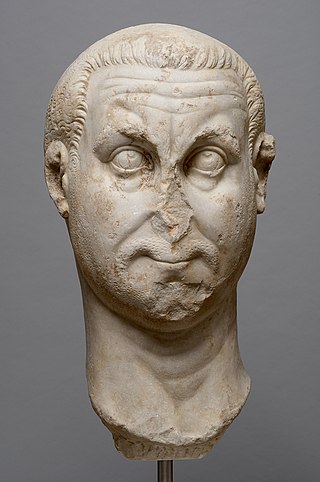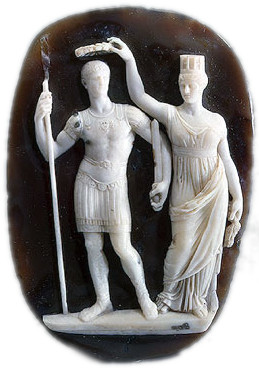Related Research Articles

Tribune was the title of various elected officials in ancient Rome. The two most important were the tribunes of the plebs and the military tribunes. For most of Roman history, a college of ten tribunes of the plebs acted as a check on the authority of the senate and the annual magistrates, holding the power of ius intercessionis to intervene on behalf of the plebeians, and veto unfavourable legislation. There were also military tribunes, who commanded portions of the Roman army, subordinate to higher magistrates, such as the consuls and praetors, promagistrates, and their legates. Various officers within the Roman army were also known as tribunes. The title was also used for several other positions and classes in the course of Roman history.

The Tetrarchy was the system instituted by Roman emperor Diocletian in 293 AD to govern the ancient Roman Empire by dividing it between two emperors, the augusti, and their junior colleagues and designated successors, the caesares.
This article concerns the period 69 BC – 60 BC.

Marcus Licinius Crassus was a Roman general and statesman who played a key role in the transformation of the Roman Republic into the Roman Empire. He is often called "the richest man in Rome".

Valerian was Roman emperor from 253 to spring 260 AD. Valerian is known as the first Roman emperor to have been taken captive in battle, captured by the Persian emperor Shapur I after the Battle of Edessa, causing shock and instability throughout the Roman Empire. The unprecedented event and his unknown fate generated a variety of different reactions and "new narratives about the Roman Empire in diverse contexts".

Valerius Licinianus Licinius was Roman emperor from 308 to 324. For most of his reign, he was the colleague and rival of Constantine I, with whom he co-authored the Edict of Milan that granted official toleration to Christians in the Roman Empire. He was finally defeated at the Battle of Chrysopolis, and was later executed on the orders of Constantine I.
Gaius Licinius Stolo, along with Lucius Sextius, was one of the two tribunes of ancient Rome who opened the consulship to the plebeians.

The gens Licinia was a celebrated plebeian family at ancient Rome, which appears from the earliest days of the Republic until imperial times, and which eventually obtained the imperial dignity. The first of the gens to obtain the consulship was Gaius Licinius Calvus Stolo, who, as tribune of the plebs from 376 to 367 BC, prevented the election of any of the annual magistrates, until the patricians acquiesced to the passage of the lex Licinia Sextia, or Licinian Rogations. This law, named for Licinius and his colleague, Lucius Sextius, opened the consulship for the first time to the plebeians. Licinius himself was subsequently elected consul in 364 and 361 BC, and from this time, the Licinii became one of the most illustrious gentes in the Republic.
Marcus Statius Priscus Licinius Italicus was a Roman senator and general active during the reigns of Hadrian, Antoninus Pius, and Marcus Aurelius. Contemporary sources refer to him as Marcus Statius Priscus or simply Statius Priscus. He was consul for the year 159 as the colleague of Plautius Quintillus; Priscus was one of only two homines novi to attain the ordinary consul in the reigns of Antoninus Pius and Marcus Aurelius.
Tribune of the plebs, tribune of the people or plebeian tribune was the first office of the Roman state that was open to the plebeians, and was, throughout the history of the Republic, the most important check on the power of the Roman Senate and magistrates. These tribunes had the power to convene and preside over the Concilium Plebis ; to summon the senate; to propose legislation; and to intervene on behalf of plebeians in legal matters; but the most significant power was to veto the actions of the consuls and other magistrates, thus protecting the interests of the plebeians as a class. The tribunes of the plebs were typically found seated on special benches set up for them in the Roman Forum. The tribunes were sacrosanct, meaning that any assault on their person was punishable by death. In imperial times, the powers of the tribunate were granted to the emperor as a matter of course, and the office itself lost its independence and most of its functions.
The Licino-Sextian rogations were a series of laws proposed by tribunes of the plebs, Gaius Licinius Stolo and Lucius Sextius Lateranus, enacted around 367 BC. Livy calls them rogatio – though he does refer to them at times as lex – as the plebeian assembly did not at the time have the power to enact leges (laws).

A consular tribune was putatively a type of magistrate in the early Roman Republic. According to Roman tradition, colleges of consular tribunes held office throughout the fifth and fourth centuries BC during the so-called "Conflict of the Orders". The ancient historian Livy offered two explanations: the Roman state could have needed more magistrates to support its military endeavours; alternatively, the consular tribunate was offered in lieu of the ordinary consulship to plebeians so to maintain a patrician lock on the consulship.
Lucius Sextius Sextinus Lateranus was a Roman tribune of the plebs and is noted for having been one of two men who passed the Leges Liciniae Sextiae of 368 BC and 367 BC. Originally, these were a set of three laws. One law provided that the interest already paid on debts should be deducted from the principal and that the payment of the rest of the principal should be in three equal annual installments. Another one provided restricted individual ownership of public land in excess of 500 iugeras and forbade the grazing of more than 100 cattle on public land. The most important law provided that one of the two consuls be a plebeian. Having been reelected nine times, Lucius Sextius Lateranus and Gaius Licinius Stolo held the plebeian tribunate for ten years. In 368 BC the laws regarding debt and land were passed, but the law regarding the consulship was rejected. In 367 BC this law was passed. In the same year the two tribunes of the plebs proposed a fourth law concerning the priests who were the custodians of the sacred Sibylline Books, and Lucius Sextius Lateranus was elected to serve as consul for the year 366 BC. Livy wrote that he was "the first of the plebeians to attain that honour."

The Battle of Adrianople was fought in Thrace on July 3, 324, during a Roman civil war, the second to be waged between the two emperors Constantine I and Licinius. Licinius was soundly defeated and his army suffered heavy casualties. Constantine built up military momentum, winning further battles on land and sea, eventually leading to the final defeat of Licinius at Chrysopolis.

The Battle of the Hellespont, consisting of two separate naval clashes, was fought in 324 between a Constantinian fleet, led by the eldest son of Constantine I, Crispus; and a larger fleet under Licinius' admiral, Abantus. Despite being outnumbered, Crispus won a very complete victory.
Publius Licinius Crassus Dives was consul in 205 BC with Scipio Africanus; he was also Pontifex Maximus since 213 or 212 BC, and held several other important positions. Licinius Crassus is mentioned several times in Livy's Histories. He is first mentioned in connection with his surprising election as Pontifex Maximus, and then several times since in various other capacities.
Marcus Licinius Crassus, grandson of the triumvir Marcus Licinius Crassus, was a Roman consul in the year 30 BC as the colleague of Octavian. He was best known for his successful campaigns in Macedonia and Thrace in 29–27 BC, for which he was denied customary military honors by Augustus.
Publius Licinius Crassus was Roman consul for the year 171 BC, together with Gaius Cassius Longinus.
Titus Pontificius was a tribune in ancient Rome in 480 BC.
References
- Livy, Ab urbe condita , 2.43